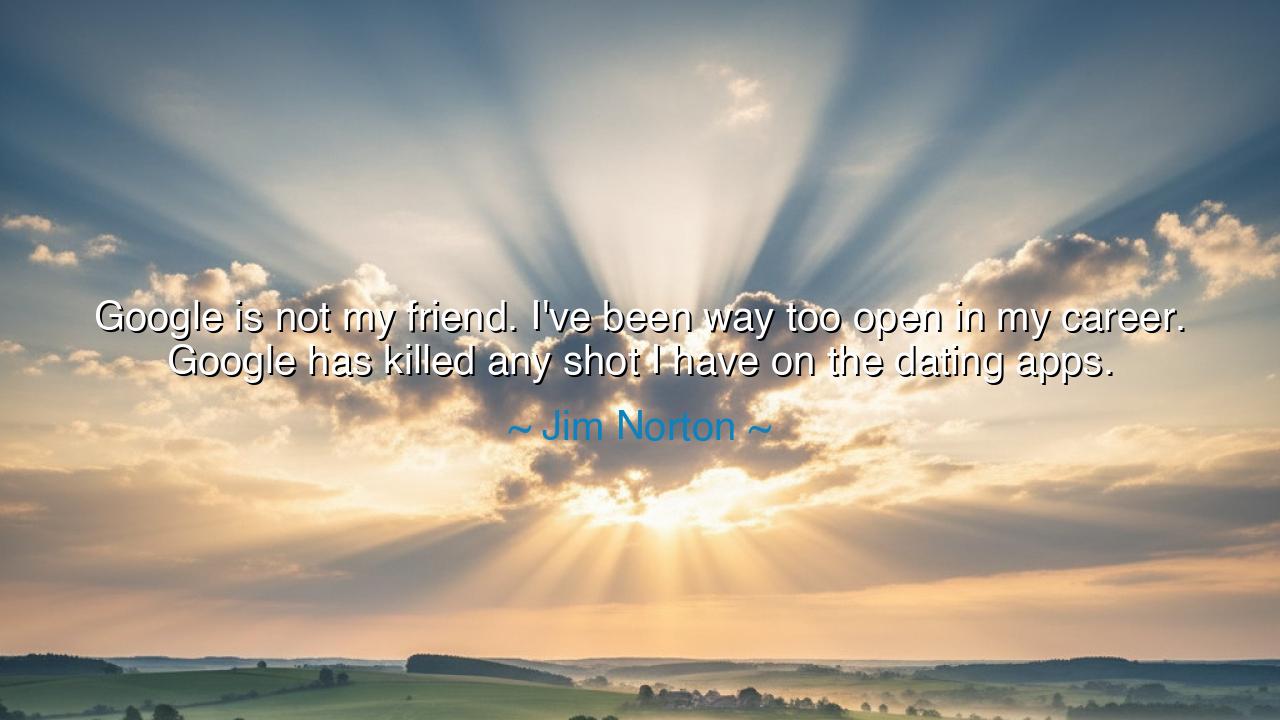
Google is not my friend. I've been way too open in my career.
Google is not my friend. I've been way too open in my career. Google has killed any shot I have on the dating apps.






When Jim Norton said, “Google is not my friend. I've been way too open in my career. Google has killed any shot I have on the dating apps,” he spoke with the voice of a man confronting the strange curse of modern fame—the loss of privacy in a world that remembers everything. Beneath his humor lies a truth that would have astonished the ancients: that in our age, one’s past never truly dies. What was once whispered is now etched in the light of screens, and what was once forgotten is now immortalized in digital stone. His lament, wrapped in jest, carries the weight of wisdom: that openness, once a virtue of honesty, can become a burden in a world without mercy or forgetfulness.
To say “Google is not my friend” is to acknowledge the new power that shadows every human being—the power of information without context. In the old days, a reputation was shaped by the living witness of a community. People were known not by what was said about them, but by what was remembered through shared life. Now, a search engine replaces the village memory, but without the warmth of understanding. It records every stumble, every confession, every joke stripped of tone, and presents them to strangers as judgment. Norton, the comedian, has lived by openness, using laughter as his art and confession as his weapon. Yet the very candor that freed him on stage now binds him in the arena of human connection.
The ancients knew of this peril in another form. Consider Diogenes the Cynic, who lived in a barrel and declared that honesty was the highest virtue. He mocked society’s hypocrisy, speaking truths others feared to utter. Yet even he was shunned by many for his raw candor. He wielded truth like a sword and found that few could stand before its naked edge. So too does Norton, in his time, bear the mark of the truth-teller—the man who dares to reveal himself completely, only to find that the world loves truth in theory but not in practice. The modern Diogenes faces not the crowd in the marketplace but the invisible mob behind screens, armed not with stones but with search results.
And in his jest about dating, there is more than self-pity—there is irony, even tragedy. The man who has made his life an open book now suffers because others cannot read it with compassion. In the realm of love, where mystery and discovery once wove the dance of affection, all is now laid bare before the first meeting. A person’s digital shadow precedes their soul, and judgment arrives before understanding. Norton’s words are not merely personal; they are prophetic. They reveal how technology has turned memory into weapon, and curiosity into suspicion.
Yet we must not despair. From this reflection rises a greater lesson: truth must be balanced by discernment. The ancients taught that wisdom is not found in total silence, nor in total exposure, but in the art of knowing when to speak and when to withhold. There is a difference between honesty and overexposure, between vulnerability and surrender. Norton’s lament is the cry of one who gave all without defense. It teaches us that while openness may free the spirit, it also invites judgment—and so one must guard the sacred parts of oneself, not out of shame, but out of respect for their sanctity.
Let this be a teaching for the children of the digital age: do not give all your truth to the wind, for the wind does not love you—it only carries your words where you cannot follow. Share deeply, but share wisely. Build your reputation not upon the unfiltered noise of confession, but upon the quiet strength of consistent virtue. Speak when your words heal or enlighten, but let silence protect your soul when the world demands spectacle.
So when we hear Jim Norton’s lament, let us not laugh only, but understand. He is both jester and sage, showing us that in an age of permanent memory, the art of living requires balance—between authenticity and restraint, transparency and mystery. The ancients had scrolls that burned, letters that faded, reputations that could be rebuilt. But our words now live forever. Therefore, speak with truth, but also with foresight. For even in the boundless light of the digital age, wisdom still begins where speech meets silence.






AAdministratorAdministrator
Welcome, honored guests. Please leave a comment, we will respond soon